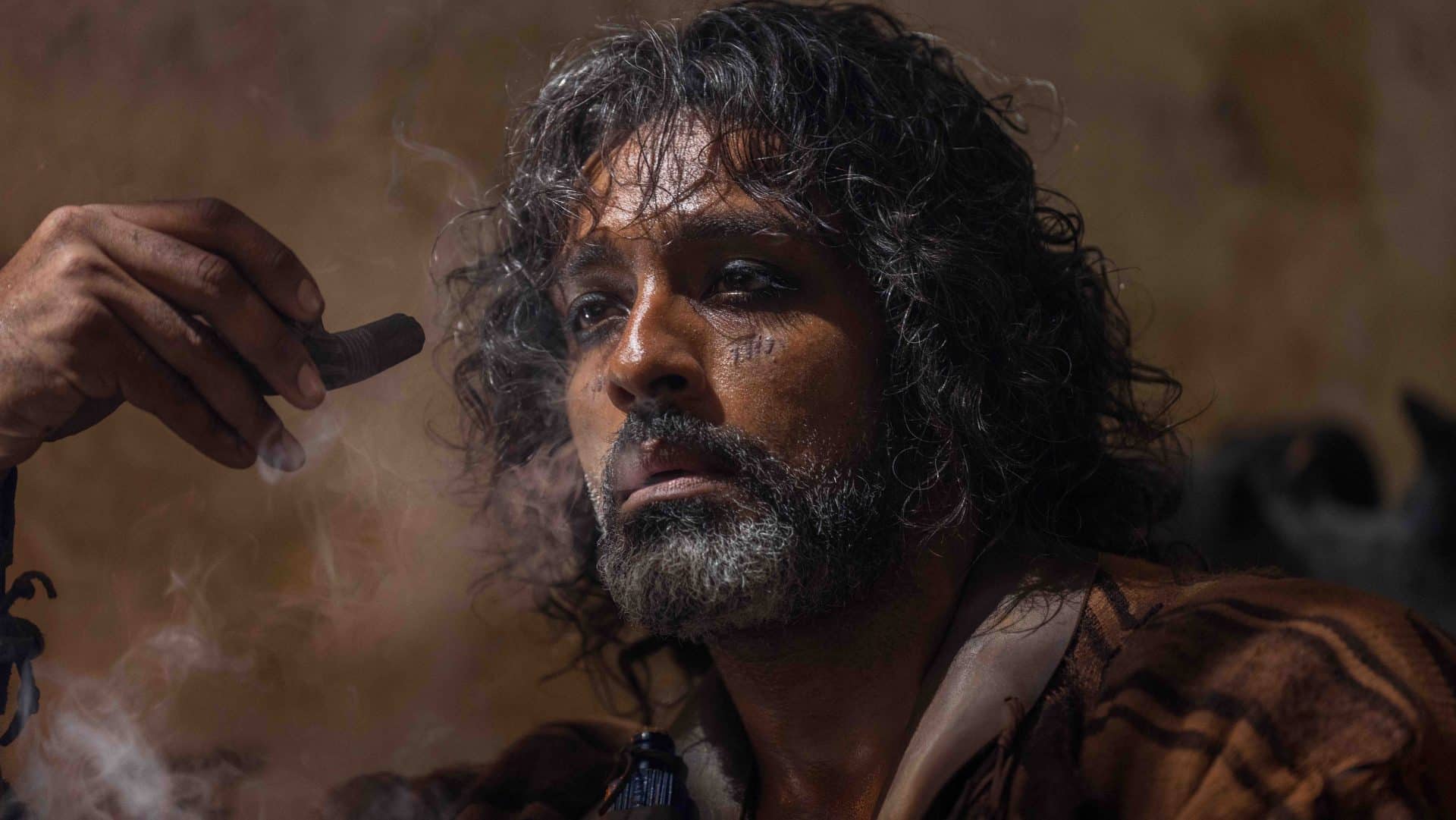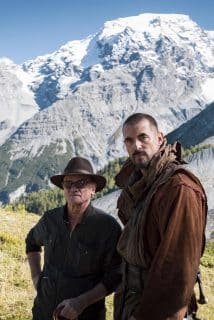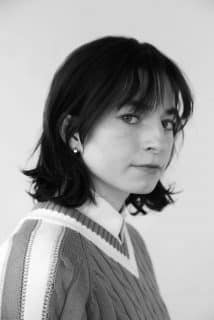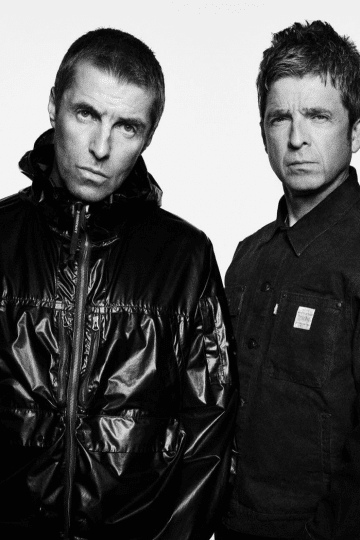Alexander Karim on Gladiator 2, Paul Mescal and how to ‘echo through eternity’
Culture
Alexander Karim has a pivotal and profound role opposite Paul Mescal in Gladiator 2, and the character's wisdom extends to the man himself, as this interview with this very different actor shows
Gladiator II is undoubtedly a triumph, being Ridley Scott’s biggest UK hit at the box office, but more importantly, a powerful piece of work.
Fulfilling the demands of historical epic spectacle, it also has a heart and sensitivity in a manner that made the original such an all-time classic. In the journey of Paul Mescal’s Lucius, you have a story about identity, belonging and family, not merely fighting (though there’s plenty of that).
A crucial part of this is Ravi, Lucius’ healer and mentor, played by Alexander Karim.
“Ravi is a former gladiator turned doctor, cook man for the gladiators,” Alexander tells us over Zoom, “Ravi is a man who’s decided to lay down his sword and instead of taking life, he wants to become a healer. He’s now a free man and has a family and a wife and kids.
Lucius, in essence, is just a little boy. His father died and his mother abandoned him and he thinks he’s lost his wife and his friends back home. He’s taken as a slave to Rome and so what he needs is a family to rebuild his life.
So Ravi’s role in that is not only to stitch up the wounds that he acquired in the arena, it’s to jumpstart his heart basically, and to mend him.”
Alexander is an acclaimed Swedish actor who has worked with heavyweights like Lars von Trier and is also an author and screenwriter; he is not your run of the mill action film guy.
In fact, as a more literary type obsessed with telling stories, this launch into the glitz and glamour of a big Hollywood production has been something of a refreshing blast for him. He’s had parties to go to, took his wife to the London premiere where King Charles was in attendance and, less flashily, “visited lots of basements to record podcasts.”
His experience working on the actual film was actually more on that glitz and glamour side, as opposed to being locked in a studio doing green screen work. Famously, Ridley Scott was insistent on an old school historical epic production, with massive sets and hundreds of extras on location in Malta. It was the director’s attention to the smallest details that really blew Alexander away though.
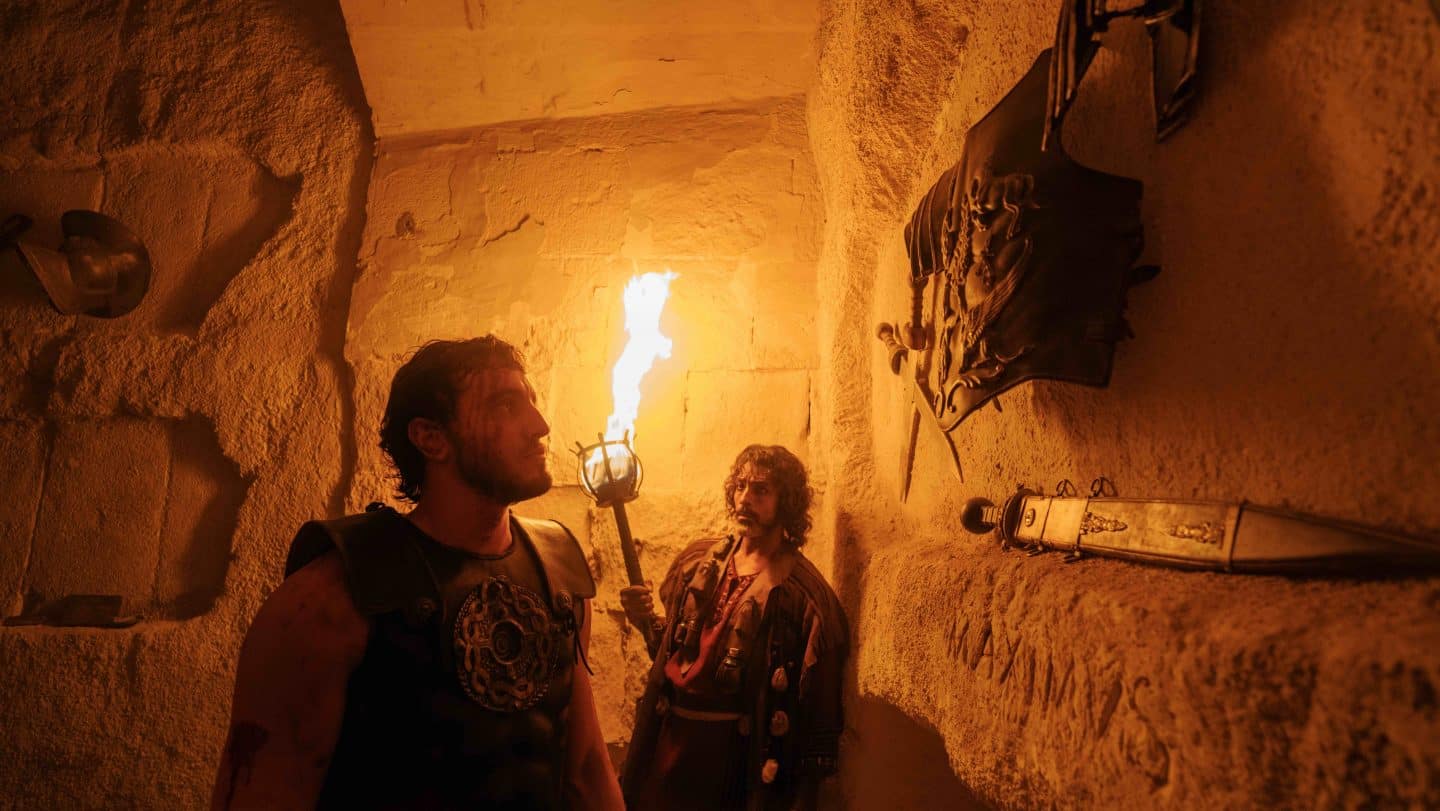
“My first encounter with him was I went to his trailer to go through my wardrobe and to talk about the character,” he says, “Someone from wardrobe came over with some of the suits of armour for the extras, just pictures, and he goes, ‘I think that this button on the breastplate of extra number 273 has to be about half an inch bigger….’
I’m thinking to myself, there’s never gonna be a close-up of that extra, there’s hundreds and hundreds of extras, nobody’s gonna see that. But that attention to detail throughout is what makes him Ridley Scott. The extras could wear could wear sneakers if they want, but he’s not gonna do that.”
And this is not ego or eccentricity on the part of Ridlet, it has a purpose, says Alexander: “That’s the reason I believe why you can walk onto his set and relax. Because he creates this perfect world where nothing is out of place.
You walk on and it’s huge and it’s massive and you can feel the weight of the set. I’m sure that could scare a lot of people but once everything has been once he set the table for you he just says, ‘Now go play, have fun in there. And while the camera is rolling, you can just add something and hope that he likes it. He’s open to that. You’re not gonna go off on a soliloquy unplanned but he’s up for life in front of the camera.
He makes it quite nice and easy for you because it’s so immersive.”
Adding to this immersion is his unique method of shooting all coverage at once rather than stopping and starting: “He has seven cameras rolling at the same time. A scene doesn’t take very long to shoot because you don’t have a lot of setups. Everything’s already set up. And it means you get to stay in the scene longer.
I”m walking in from outside, walking past 350 gladiators and stopping in a few cells and then I make my way all the way down to Paul’s table where I sit down… and all that’s covered in one take, with close-ups. You just have to do all of that maybe two or three times and you have that scene. You get to live it. I just loved it.”
Ah yes, Mr Mescal, who is of course a proper superstar now, though one who seems to casual observers, a nicely unpretentious one. Alex reinforces this, saying, “He’s an absolute professional, but he’s just like a guy you’d bump into in the pub, the coolest, most down-to-earth guy. You’d never think he’s an Academy Award nominated megastar.”
In terms of acting styles, there wasn’t any macho method going on, and while Alex says he has stayed in character once, in Paul Schrader’s Dying of the Light opposite Nicholas Cage – “because the character was so distant to me” – it suits him to approach things in a more sociable way.
“I’ve learned that it works the best if I chat, if talk to the crew, talk to everybody get to know everybody, create a comfortable spot for me to because at the end of the day what you’re doing is you’re getting undressed in front of people,” he says, “Sometimes literally! But you’re getting in front of people and you’re showing them your heart And that for me is a lot easier if I know that there’s friendly eyes around. If we’re friends I can show you my heart, if we’re not it’ll be more difficult.
So I get the crew on my side, and feel love from them, so when the camera rolls, you can relax and say, this is my dirty self. This is the dirty side of me. And you show it. Then you hope that they still like you!”
In other words, there is a need to touch upon your own ugliness, if there is need to play ugliness in a character:
“I doesn’t have to be violent criminals that you’re playing, it could be someone who’s extremely selfish, or a liar, but you have to play honestly for it to work. And to play it honestly you have to show people that I also lie or I also am selfish. Otherwise it won’t work I feel.”
I ask if that was part of the appeal of acting, to explore different sides of himself.
“I think when you’re young you don’t even know you’re going to have to show off those sides of yourself. Nobody wants to show those sides. That’s why they’re hidden.
I always feel like the reason for most people to start off acting is like when Dustin Hoffman said asked Laurence Olivier, ‘Why do we do what we do?’ And Olivier leaned over and said, ‘Look at me, look at me, look at me, look at me, look at me.’
I believe that that’s the reason why, why people start off, and then throughout the journey, you get to realise that, oh my god, now I’m just showing different parts of myself.
If you try to do it honestly, you will learn about yourself and about life.”
In 2009, Alex wrote a script with a brother based on the true story of his family. It was made into the Swedish TV series, ‘Familjen Babajou’, and in it Alex played his own father, which as you’d imagine, brought up difficulties but also new insight, even healing.
“The basic gist of the story is that our mother and father divorced, and my father went back to Uganda and we stayed in Sweden. I played my own father and my brother was directing. It got to point of the script where he leaves the family…
And throughout your whole life when you have a dad that left, you first start idolising them until you’re twelve or thirteen. You think he’s off fighting an evil dragon somewhere, he’s off conquering this or that.. and then you get to a point where you just get pissed off. You’re fifteen or sixteen and you’re like, ‘that asshole he just up and left,’ and then you’re pissed into your twenties.
When we shot this thing I was 31, and I had just had my first child. I got to the part where he has to leave his family and get on the boat and sail off to go from Sweden to Denmark to fly down there.
And I told Baker, my brother, ‘I don’t get it. I can’t play this scene.’ He’s like, ‘What do mean? I said, ‘I don’t get it. I do not understand why he’s getting on the boat. I can’t get it. And to play it, I have to understand it. I have to believe it. Or I can’t play it. I need to understand it.’ I
t took weeks and months of introspection.
My daughter is crying all day and all night, I’m walking around and reading the script, and I’m in hell, basically. And then one day it just dawned on me, I just realised the difficulties of life, just living.
I realised, maybe in some situations, it’s better to be separated and happy than together and miserable.
There’s something in it, that if you’re not happy together, then maybe for everyone’s sake, we can be happy, but in different parts of the world.
Also the fact that distance doesn’t mean the end of love. There’s still that bond.
When I realised that I said I know how to do this, and in that very moment when I played the scene, an obviously very emotional scene but right after that all the anger for my father just went.
That’s the big reason for acting.
It’s you’re constantly looking for something and you can’t get all the answers and every new part that you take is another go. It’s kind of like being a scientist. Albeit not as important. But there’s a science to it. There’s that idea of every new project you start at zero and you have to find a million answers to something.”
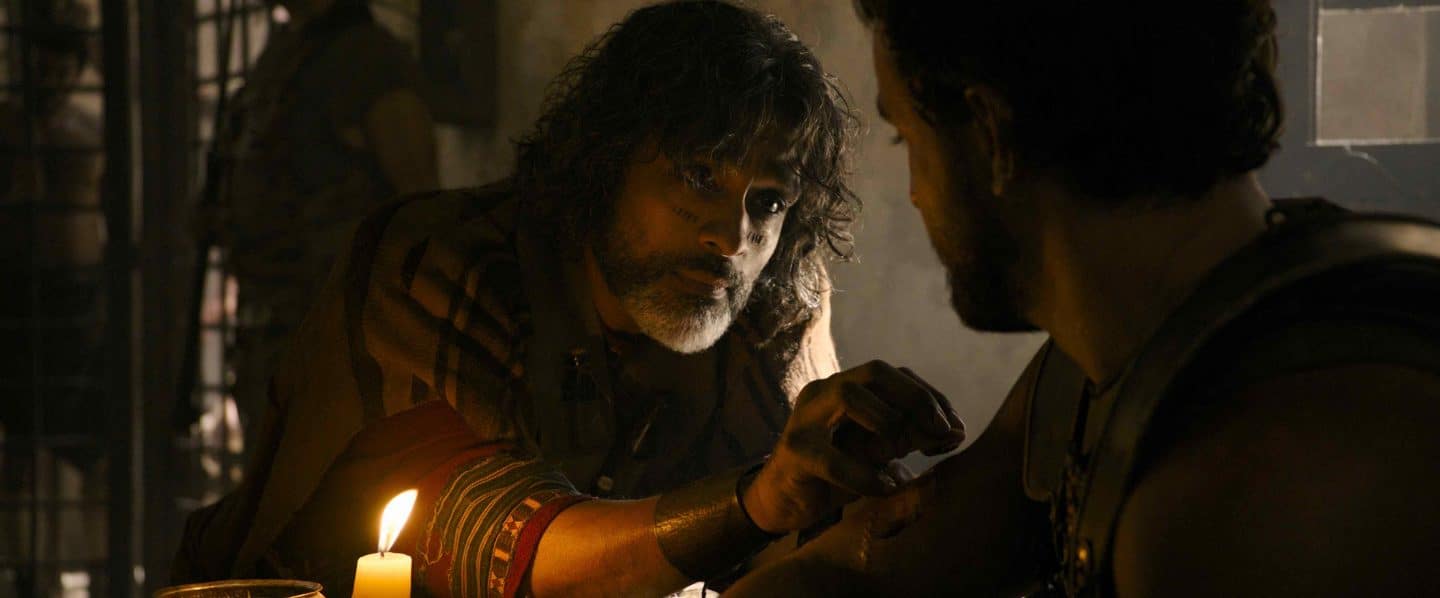
A powerful and intriguing approach indeed. One where you have to find something in yourself in order to do your job well on screen. In a world where often actors underplay what they do, it’s good to hear that there’s some serious intent there too, after all, why are we all addicted to film and TV shows? It’s because we connect with a certain honesty in the performances that truly moves us.
Alex found something in Ravi in Gladiator II that allowed him to unlock the character, something which made him reflect on his whole career which has dived between LA and Sweden.
“When I graduated from drama school back in 98, I felt like Maximus in the original Gladiator. You’re this young, hungry soldier.
You’ve played Hamlet in school, but when you’re out of the safety of drama school, all of sudden you’re trying to get a Taco Bell commercial and you can’t. You’re trying to get anything but nothing works.
The first Gladiator came out the year when I got out of drama school in LA. It was like I had this whole Roman Empire to defeat, and this mountain which says Hollywood. You think you cannot climb the mountain but then Maximus did and you feel okay maybe I can do it.
As time goes by the mountain changes and you shift from wanting to be Tom Cruise or the biggest movie star in the world, but once you have a family, you get to a point where you’re like, I just want to practice my art. I want to do meaningful parts that matter and they need to matter enough for me to be away from my family.
What Ravi gave me was the line, ‘what we do in life echoes in eternity.’
Ravi’s not talking about that Hollywood mountain. He’s not talking about fame or fortune or money or power. He’s talking about what we do in life echoes in eternity. That’s why he laid down his sword and stopped killing people because now he has that which will echo in eternity. He has his wife and he has his children.
What he’s talking about is not build me a statue and that will stand for eternity. He’s saying the love that I show my children, they will show their children, and they will show their children… what we create in love will echo in eternity.
That’s something that resonated with me with Ravi.”
The whole film is interesting around masculinity, with Lucius certainly a different, more vulnerable man than Maximus, although Russell Crowe’s performance was way ahead of his time in its raw depiction of the deepest trauma. I asked Alex if Gladiator II made him consider what being a man means?
“I did, I did. Maximus has died and his legacy echoes in eternity. And I keep using that phrase because it’s such a poignant phrase for the film and the theme.
There’s a lot of blood and guts and war, but if you look at the heart of the story, it’s about that little boy and what he thinks his legacy is. His father died and he was banished by his mum but the truth of that legacy is his mum rescued him out of love and that’s the love that she had for his father. So that love from father to son keeps on echoing through him and he has to pass that on.
That is that’s sort of brought to the forefront when I talk about my family. When he says, I know that you’re surrounded by blood and war and death, but remember that what your father’s true legacy is what echoes through you, as my legacy echoes through my kids.”
A strong message indeed in our troubled times.
Post-Gladiators II, Alex is not going to be getting carried away. He’ll be heading back to his production work and writing his books, “the work I can control. For my acting career, I don’t plan that at all, I leave it in the hands of agents and managers and casting people. I realised early in life that the only way to have peace of mind as an actor is to have so much other stuff going on that when the phone rings it’s an annoyance.”
His wife is an author too and it seems that a certain bliss for him, both of them writing and then swapping over to read each other’s work, and that work being. “Just you Nobody else is making decisions for you. You don’t have to ask permission to say a line this way or that way. You decide if there’s rain or sunshine on the page. It’s your world.”
Finally, I ask him for final thoughts on Gladiator II, to which he excellently responds, “What I really enjoy about it is it’s really a story that could have taken place in a suburb of London. It’s a little boy who feels abandoned and came back to this little town. It could have been a Ken Loach film, but it’s set to a Ridley Scott backdrop of gladiators in Ancient Rome.”
Gladiator II is still in cinemas. Follow Alexander on Instagram.
Trending

Join The Book of Man
Sign up to our daily newsletters to join the frontline of the revolution in masculinity.




